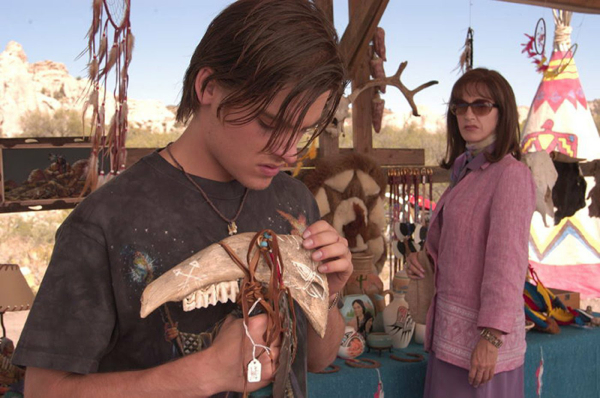Movie review by Greg Carlson
While Felicity Huffman deserves praise for her impressive portrayal of a pre-op male-to-female transsexual in “Transamerica,” the film itself is a mess – a grab bag of road movie clichés and finger-wagging self-importance that’s a chore to watch from start to finish. Marking the feature filmmaking debut of writer-director Duncan Tucker, “Transamerica” is preachy when it aims to be moving, flat when it aims to be funny, and shrill when it aims to be emotionally charged. Earnest to a fault, “Transamerica” places its central character in a maelstrom of grotesquery and intolerance, with practically the entire supporting cast stuck playing two-dimensional stereotypes as opposed to fully formed people.
Los Angeles waitress Bree (Huffman) is just a week away from a long-awaited sex change operation when she is informed that an ages-ago sexual encounter yielded a son, Toby (Kevin Zegers), now a troubled teenager in lockup in New York City. Despite her great reluctance to deal with the situation, Bree is cajoled by her therapist (Elizabeth Pena) into bailing the kid out of jail. Naturally, Bree chooses not to tell Toby about her status as the boy’s father, and the pair embarks on a cross-country road trip that gives the movie its titular pun.
Why someone as determined as Bree would agree to drive her son to rural Kentucky (in a junky, dodgy old station wagon purchased from a drug dealer, no less) is not satisfyingly explained by Tucker, who seems hell bent on providing the audience with a wacky journey filled with colorful vignettes and lessons learned. The movie’s success depends on the challenging relationship that develops between Bree and Toby, but Zegers’ role is both underwritten and underplayed: Toby is an addict and a hustler, but rarely if ever does Tucker make an effort to get under the surface of Toby’s anger and disillusionment.
Like nearly all road movies, “Transamerica” suggests that the vast spaces between the coasts are filled with oddballs – especially when the traveling takes place along rustic backroads peppered with greasy spoon diners and souvenir-shilling gas stations. Bree seems to find a sensitive soul in a rancher played by Graham Greene, but the great performer’s screen time is limited to a few clunky scenes bogged down by exactly the type of spiritual mysticism that reinforces stereotypes about Native Americans (as opposed to dispelling them).
“Transamerica” amps up the dramatic fireworks when Bree and Toby stop in Phoenix to visit Bree’s parents and sister. One of the film’s longest and most sustained interludes, the Arizona stopover provides Huffman with the opportunity to explore the limits of Bree’s sense of self. Fionnula Flanagan, as Bree’s garishly dressed, difficult mother teeters on the brink of parody as she humiliates and belittles her offspring. The one-sidedness of Bree’s familial antagonists unfortunately results in a black-and-white simplicity that erases any possibility of subtlety. “Transamerica” is not likely to be remembered for much beyond Huffman’s performance, and in a sense that is too bad. Huffman does a great deal with a role of a lifetime – even if it means playing a character who deserves a much stronger story.
